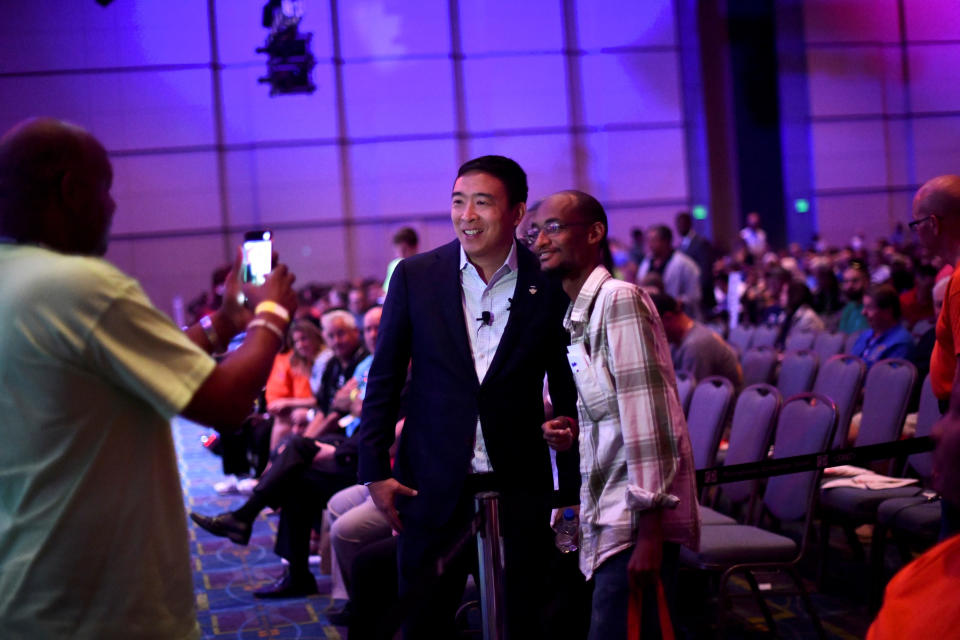4 problems with Andrew Yang’s free money drop
Free money from the government. It’s actually a serious idea. And Democratic presidential candidate Andrew Yang has dangled it like candy before voters.
Yang is a fan of “universal basic income,” which is a lump sum transferred by the government to every adult citizen, every month, with no strings attached. The idea is that people looking out for themselves will spend the money better than giant safety-net programs might allocate it, providing a buffer against poverty, job dislocation and people losing out in a tech-driven knowledge economy.
In theory, universal basic income would address worsening income inequality and provide money underprivileged people could use for education, investment or anything else they feel would help them get ahead. Working parents would have help paying for child care or taking time off to care for a newborn or sick child. UBI could help cover surprise medical bills or a furnace that conks out and needs to be replaced.
Yang calls his version of UBI the “freedom dividend,” and would set the payout at $1,000 a month for every American 18 and over, or $12,000 per year, no matter how rich or poor. People currently receiving some kind of welfare payment wouldn’t get both—they’d have to choose between their current benefits or the $12,000 annual payout.
Some voters love the idea. After Yang announced a UBI contest during the Sept. 12 Democratic debate, nearly half a million people signed up for the chance to be one of 10 winners receiving the Yang handout for a year. It’s gimmicky, but as the centerpiece of Yang’s presidential campaign, UBI has kept him on the debate stage and made him more popular than members of Congress and other presidential candidates becoming also-rans.
Not surprisingly, however, there are some major problems with Yang’s UBI. Here are four:
It’s enormously expensive
A $12,000 annual stipend for all 256 million adult Americans would run about $3 trillion per year. The government currently spends about $4.5 trillion per year, so Yang’s UBI would represent a 67% increase in federal outlays. There would be some offsets. Since current welfare recipients wouldn’t be allowed to double-dip, there’d be a decline in the $500 billion in annual welfare spending. But the increase in federal spending would still be epic, requiring...
Sharp tax hikes.
Yang wants to impose a 10% value-added tax, which would be like a federal sales tax. VATs are in effect in 168 countries and they’re proven revenue-generators. “A gradually phased-in VAT could have the potential to let us have our cake and eat it too, in terms of raising long-term revenue,” says William Gale of the Tax Policy Center.
It would still be a giant tax on consumers subject to vilification by opponents likely to claim it would make baby formula and smartphones unaffordable. And a VAT wouldn’t be enough. Yang would also impose a carbon tax that would push up gas and home-heating prices and a financial transaction tax, while raising the capital gains tax rate and the payroll tax for higher earners. That’s a lot of tax hikes. In a rational nation with a rational government, it might be possible to reengineer the tax code so thoroughly and improve the overall economy. In America, today, it’s an understatement to say this is doubtful.

The abuses
Most people might spend their UBI responsibly, but there are bound to be some who head straight to the liquor store or the casino with each month’s check—and they’ll get an outsized share of media attention. A bigger problem could be abusive businesses that target recipients’ checks in who-knows-what novel ways, just as some used-car dealers offer “special deals” right around the time people get their income-tax refunds every spring. “It’s putting a big red X on every consumer’s back,” Gale says. “The unintended effects are always there.”
The work disincentive
Twelve grand a year isn’t enough to persuade most people to give up working and live off a modest government check. But it could disincentivize people on the margins of the labor force, and simply rankle a lot of voters opposed to government handouts in a country where generous, European-style welfare programs simply aren’t popular. One poll shows Americans opposed to the idea by 57% to 43%. Slim majorities of younger people like it, while strong majorities of older voters don’t. Yang has some stalwart supporters, but he still has a lot of people to convince.
Rick Newman is the author of four books, including “Rebounders: How Winners Pivot from Setback to Success.” Follow him on Twitter: @rickjnewman. Confidential tip line: rickjnewman@yahoo.com. Encrypted communication available. Click here to get Rick’s stories by email.
Read more:
The rich should get ready for Warren’s wealth tax
Trump’s trade war has killed 300,000 job
Democrats are attacking the wrong companies
Trump’s biggest gamble yet: tax hikes before an election
Obama was better for your 401(k) than Trump has been
Read the latest financial and business news from Yahoo Finance
Follow Yahoo Finance on Twitter, Facebook, Instagram, Flipboard, SmartNews, LinkedIn, YouTube, and reddit.


